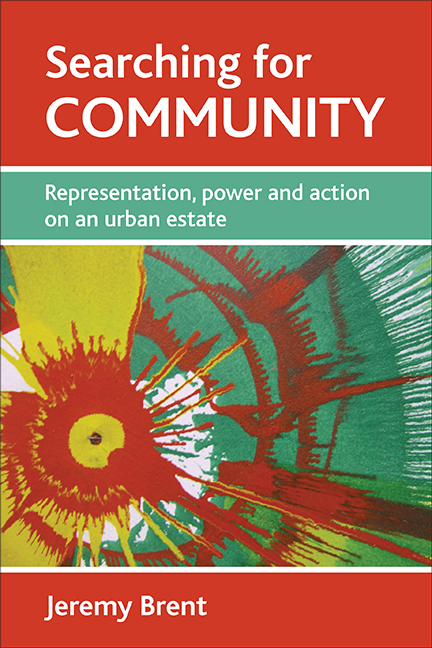Book contents
- Frontmatter
- Contents
- Foreword
- Notes on the author
- Introduction
- one Four settings: contexts and questions
- two Researching Southmead: problems of representation and participation
- three The intelligent outsider? Official and media representations of Southmead
- four Knowledge from within: community art and local representations
- five The outsider within: crossing worlds
- six Young people and community: trouble and tribes
- seven Four examples of community action in Southmead
- eight What is community anyway?
- nine Engaging with community
- ten Communicating what youth work achieves: the smile and the arch
- Author’s acknowledgements
- Epilogue: Southmead eight years on
- Afterword: Why Jeremy Brent’s work is more relevant than ever
- Bibliography
- Index
Introduction
Published online by Cambridge University Press: 22 January 2022
- Frontmatter
- Contents
- Foreword
- Notes on the author
- Introduction
- one Four settings: contexts and questions
- two Researching Southmead: problems of representation and participation
- three The intelligent outsider? Official and media representations of Southmead
- four Knowledge from within: community art and local representations
- five The outsider within: crossing worlds
- six Young people and community: trouble and tribes
- seven Four examples of community action in Southmead
- eight What is community anyway?
- nine Engaging with community
- ten Communicating what youth work achieves: the smile and the arch
- Author’s acknowledgements
- Epilogue: Southmead eight years on
- Afterword: Why Jeremy Brent’s work is more relevant than ever
- Bibliography
- Index
Summary
No easy answers: Jeremy Brent, Southmead and ‘community’
When this volume was first proposed, I said I would like to comment on the PhD thesis on which it is, in part, based and for which I was one of the academic advisers. In preparation for my contribution, I re-read the thesis, an experience that combined the contradictory feelings of sadness and of delight. My sadness stemmed from the loss of a good and kind man, a brave, thoughtful and effective professional, and a friend with whom I had shared a close intellectual and political dialogue for several years. The delight lay in recovering qualities in his work that I had admired in reading his earlier drafts – a subtle, self-reflective, ruminative wisdom, often delicious writing, an intense engagement with issues of everyday practice and with the people he worked with, and an ability to expose many different sides of the same question. There is satisfaction, too, in realising that his work remains relevant for today and so can serve as one memorial to a life of sustained human solidarity. In what follows, I want to try to specify these impressions without, I hope, losing the emotional threads that unite them.
Southmead, Birmingham, Bristol
One way of seeing Searching for community is as a story of three places (though I am sure there were more). Central, of course, was Southmead, the North Bristol housing estate where Jeremy Brent worked from 1975, first for an adventure playground, then running Southmead Youth Centre. As John Westcott puts it in the booklet produced for Jeremy's Memorial Day on 2 September 2006, ‘no one had ever worked at Southmead for so long … it turned out to be his life work’. As Jeremy himself put it, with typical honesty about his ambivalences:
This quarter of a century's involvement of mine with Southmead puzzles me. It was not my intention to stay so long when I first took work there on a six-month contract. Staying that long does indicate a strong attachment to … something. This something has not always been Southmead itself, with which I have a love–hate relationship, but the continual feeling I have of unfinished business with the place and the people, like a familial relationship. (Chapter One, this volume, pages 16-17)
- Type
- Chapter
- Information
- Searching for CommunityRepresentation, Power and Action on an Urban Estate, pp. 1 - 10Publisher: Bristol University PressPrint publication year: 2009



